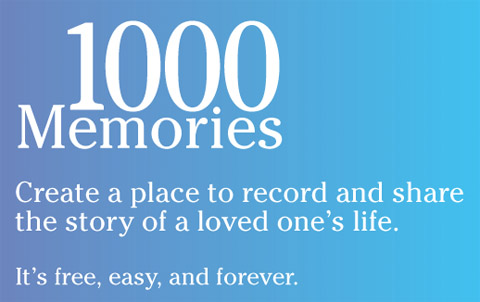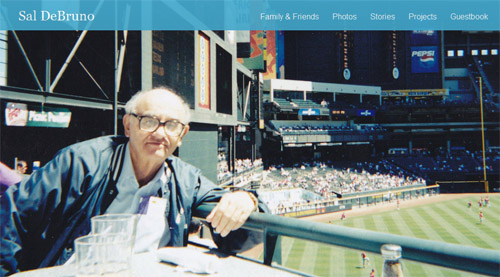Despite the option of putting a deceased Facebook user’s account into memorial mode (and necessity, to avoid suggestions to “reconnect”), Facebook is for the living. That’s okay. Social media sites weren’t intended to handle death, and only years after their inceptions recognized the dilemma and developed related policies, as Kim’s last post explains.
But now there’s 1000Memories, a no-fee, ad-free site specifically designed to bring together family and friends to share photos and stories and even undertake charity projects in a loved one’s name. While not a social media site per se — it’s reasonable to suspect that over time the memorial pages will stabilize and become more or less static — pages are the product of user-supplied content and interaction, including commenting on others’ contributions.
But even without sustained interaction (which certainly may happen), the collaborative nature of the memorials offers evocative possibilities. Not only can far-flung friends and family come together virtually to remember a loved one, it gathers in a range of voices that piece together a multifaceted life. Memories through the eyes — and in the words — of a young grandchild will be much different from those of a spouse or old fishing buddy, and it is precisely this variation, provided enough people participate, that can make the memorials so rich.
Also, significantly — the site is gorgeous, and nothing breeds confidence like good design. Unlike so many new web startups, 1000Memories gets a huge Win with actually showing what the product does before you create an account, with a few examples available to explore.
According to the Terms of Service, “Privacy settings are administered on a per memorial basis and site administrators are able to set and adjust the privacy as relevant.” Sounds reasonable. Non-private pages are also indexed and discoverable on the open web, and purportedly available “forever” — imagine the boon it could provide for genealogists, now or in the future (or lazy This American Life interns, looking for story leads).
Also stated: “Persons establishing memorials agree not to restrict the right of any legal next of kin to assume or share administrative responsibilities and fully participate in memorials established.” Yikes. Yes. 1000Memories must tread the ground of family feud craziness and black sheep.
I’d like to see a base-line bio page with general information — birthplace, education and career milestones, possibly a family tree — editable by all or in the hands of the memorial administrator, with links to the deceased’s personal blogs and other social media identities. Naturally this could be contentious — while such sites are often easily findable anyway, you may never intend your ultraconservative/-liberal relatives to read your opposing-view political rants or other sticky revelations of heart and mind. Additionally, linked sites may not remain into perpetuity, though some sort of archival mechanism would also be slick. Nonetheless, including such content would be a way to further draw in a person’s life, and in their own words.
Check out a short interview from TechCrunch with two of the co-founders, Brett Huneycutt and Rudy Adler:
We’ll be keeping our eyes on this one!


4 replies on “1000Memories, a Thousand Possibilities”
The claim here is that “there’s no way to do that right now, no way that’s respectful of the person.” That’s quite a claim when we already have a highly ethical site like MuchLoved.com. I thought I caught a disingenuous look in the speaker’s eye as he said it. Sure, 1000Memories is nicely designed, but no better, arguably, than MuchLoved, which also enables approved users to upload music, a very important ‘memorialisation feature’. Competition in this area is a good thing. Let 1000Memories compete, but let it not claim to be unique.
Hi, Charles. I don’t know whether 1000Memories claims uniqueness — I did not intend to imply it (though I can see how you might suspect it, given that line “But now there’s 1000Memories…”).
Regardless, this post wasn’t meant to be a survey of available online memorial sites — no more than it was meant as a straight-up endorsement (did you catch that nerd-talk about privacy and open web discoverability? — I’m much more interested in what they’re doing and what it means for mourning / storytelling / information policy and privacy / data-mining / etc. than I am in convincing people to use the site).
I have seen some online memorial sites, and they were terrible, thus my excitement about the design and general usability of 1000Memories, at least as far as I can tell from the previews (again, dork librarian stuff).
I had not seen MuchLoved.com — thanks for bringing it to our attention. Competition is indeed good — it’s what makes all these product/services better, as well as brings the idea of collaborative online memorialization into the public consciousness.
Meg, I entirely take your points, especially about design. I was quoting from their YouTube (or whatever) interview re their claim to uniqueness. I normally become cataleptic at the first syllable of nerdtalk but I did cock an ear when they talk about privacy issues because I think they’re very important — some sites still, I think, let any say pretty much anything on a tribute site.
It’s becoming a big biz with many overlaps. Interesting to follow, and also not un-boring, too. Distressing when one of them sinks with all memories on board.
While I’m here, please let me, if I may, award your blog a flickery candle for excellence. I love it!
Thanks for the kind words, Charles! I warrant all three of us at DeathRef wish we could devote more time to it, but we’re always glad to do what we can.
You’re absolutely right about it being “distressing when one of [the memorial sites] sinks with all memories on board.” I think the appeal of such sites is 1) it’s the internet and incorporates social media, everyone’s favorite new market and playground, and 2) it allows for distributed contribution and viewing (i.e., mourning/memorializing).
But the very nature of webcontent is typically ephemeral. It doesn’t have to be, and in this case, it certainly shouldn’t be. But it does make me nervous about the long term preservation and availability of content, especially with free sites where the providers are not contractually bound. How sustainable is free*? 5 months, sure. 5 years? well, possibly. 50? yeah right– the internet won’t even be the internet anymore. Will these sites and formats evolve?
* Some of them obviously aren’t free, and those that are typically intend to monetize with add-ons, but even so, changing formats are an issue. While other industries and markets face the same problem, memorials to the dead are arguably more important and certainly more emotionally charged (and therefore more vulnerable to bad PR) than, say, a gaming forum or recipe website). Then again, the Library of Congress is now archiving every tweet–it’s so hard to predict what The Future will be interested in.